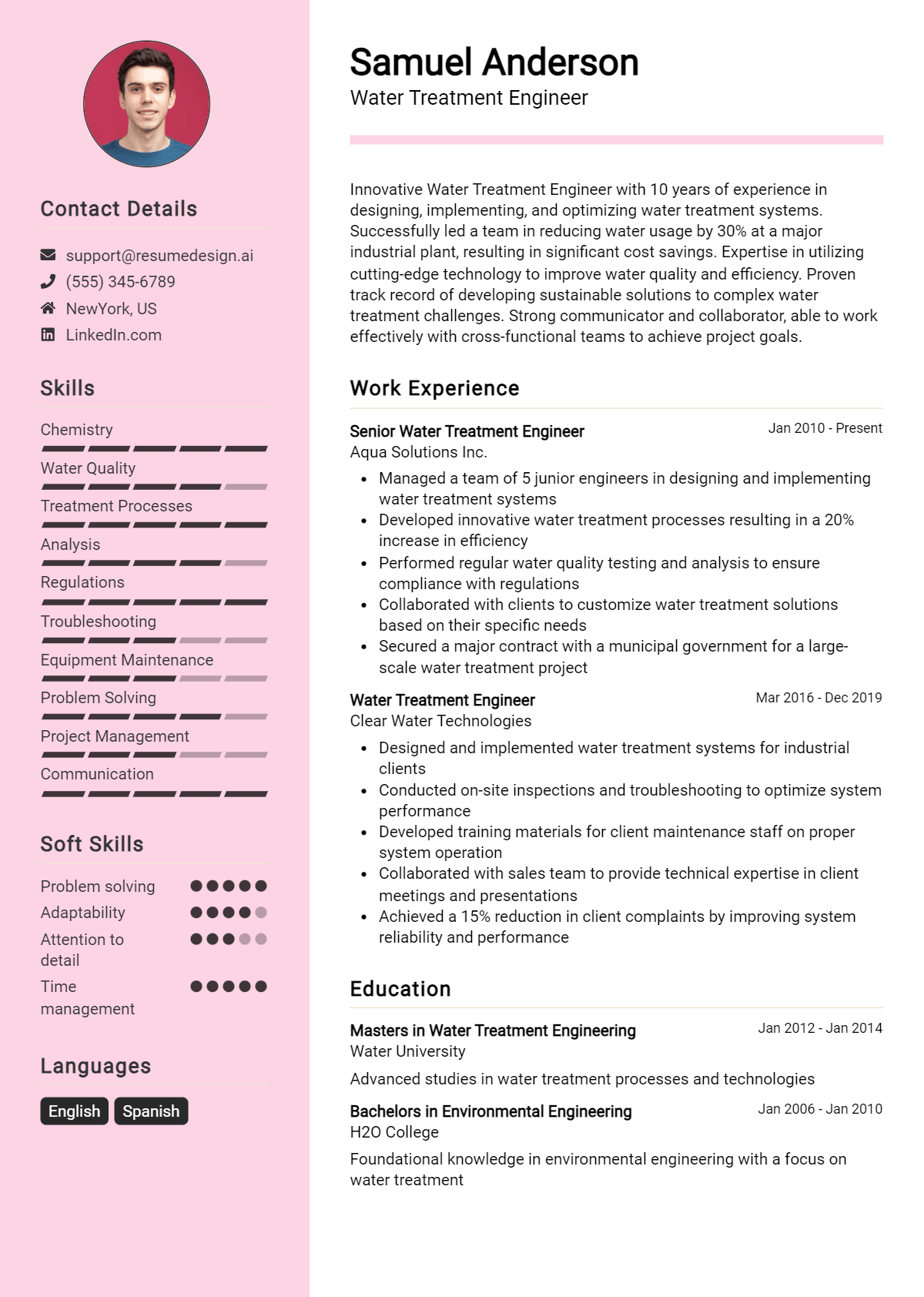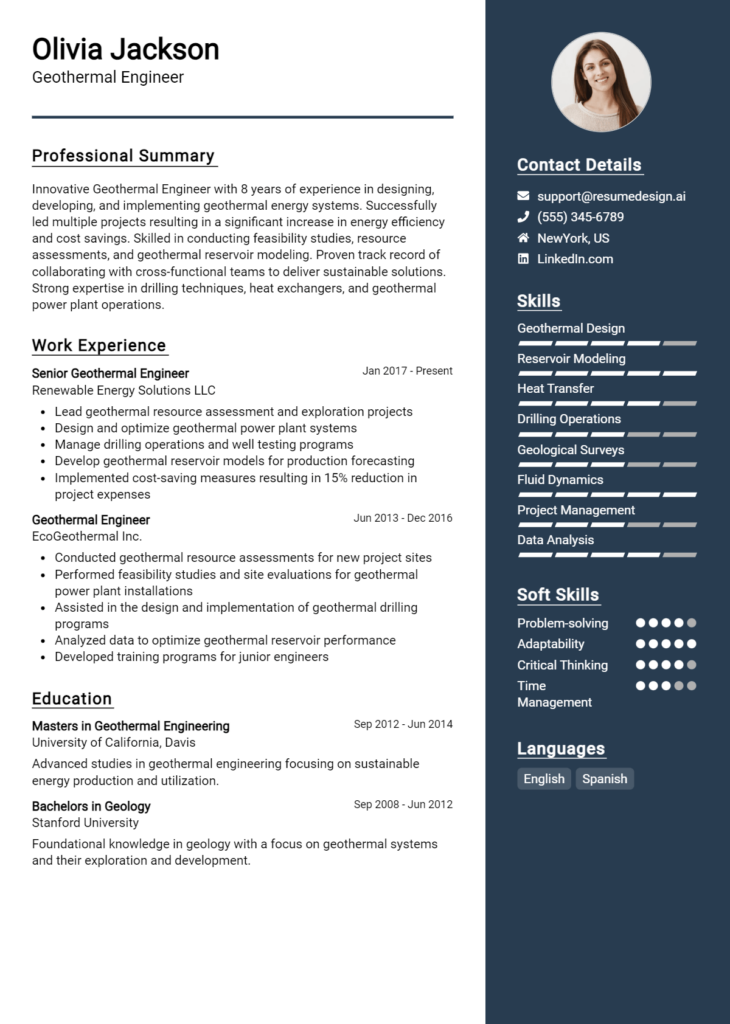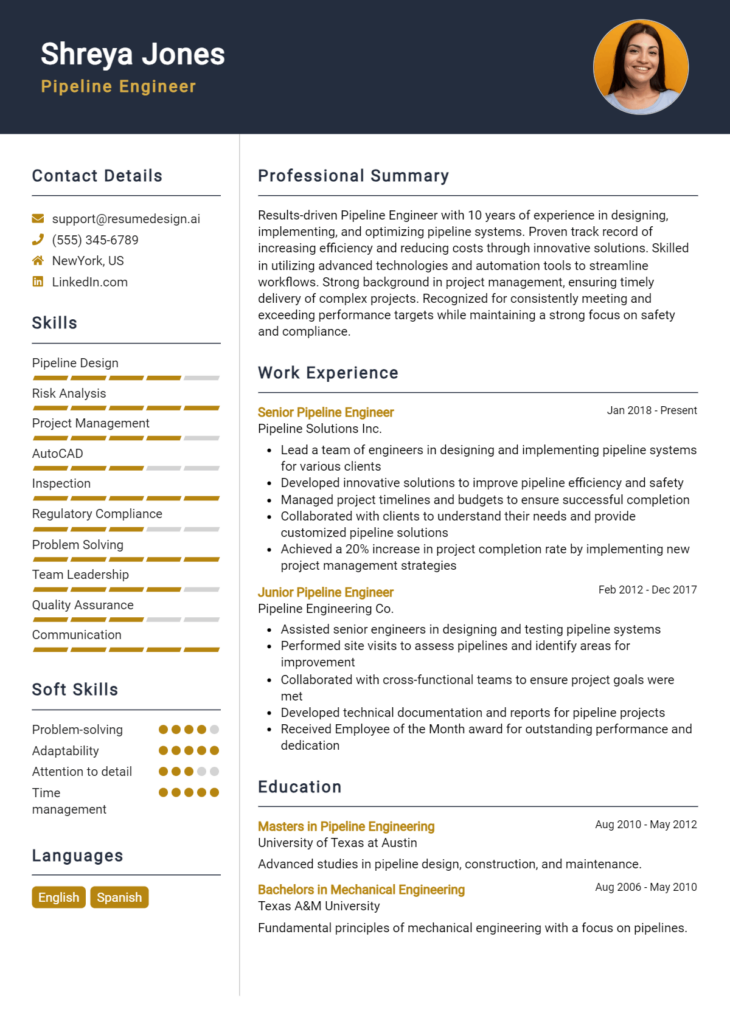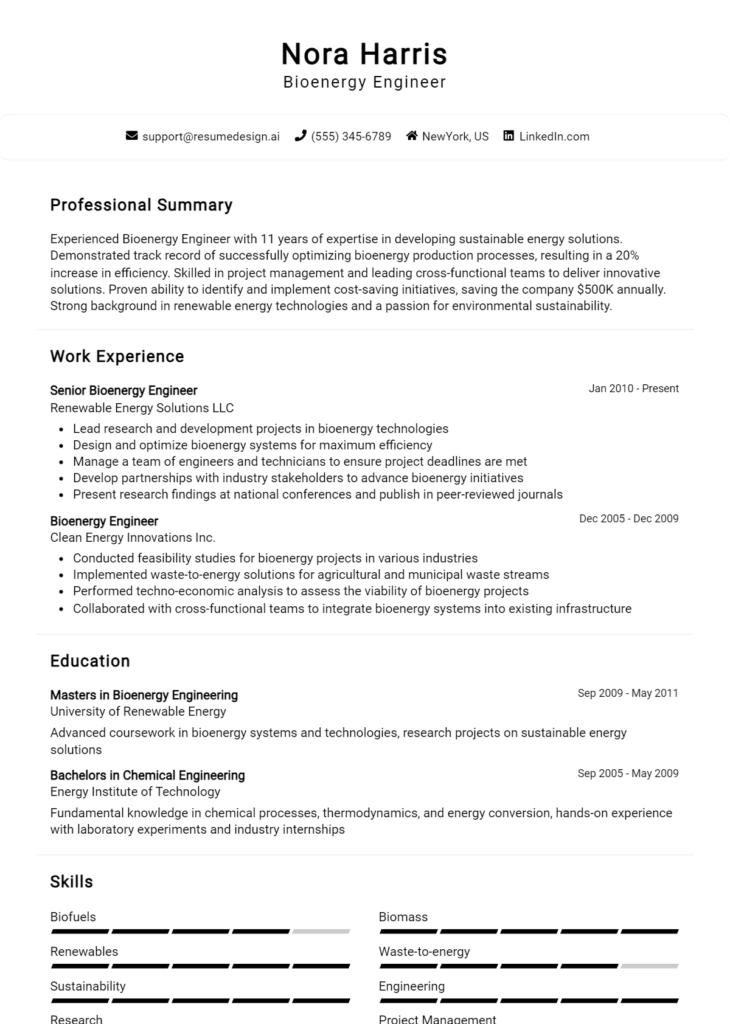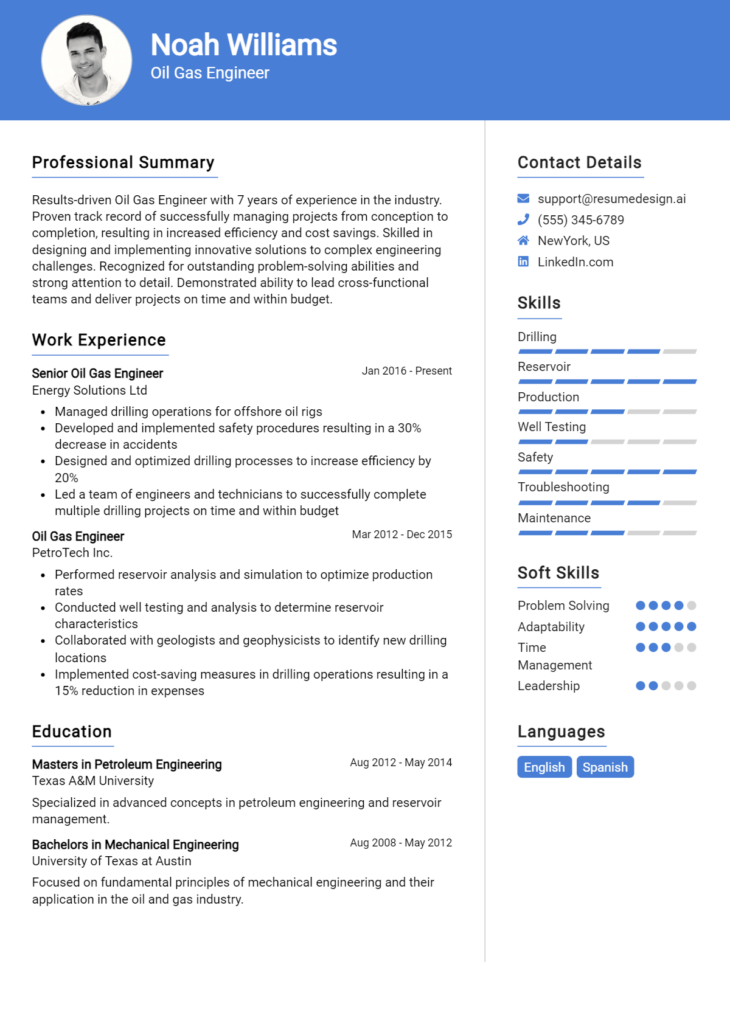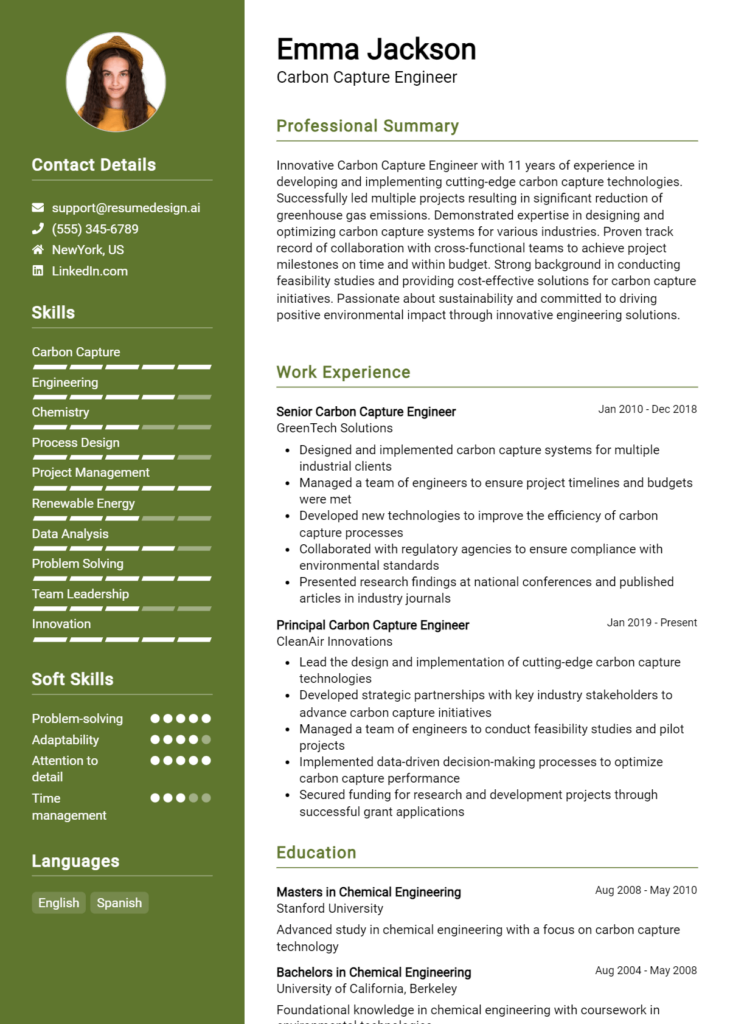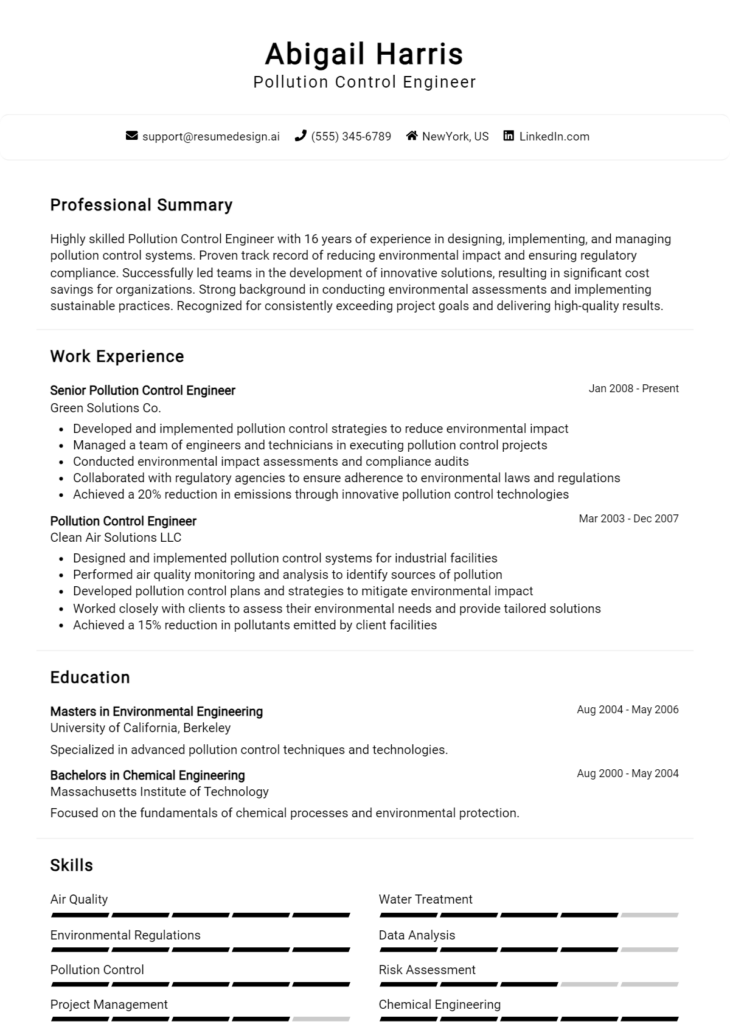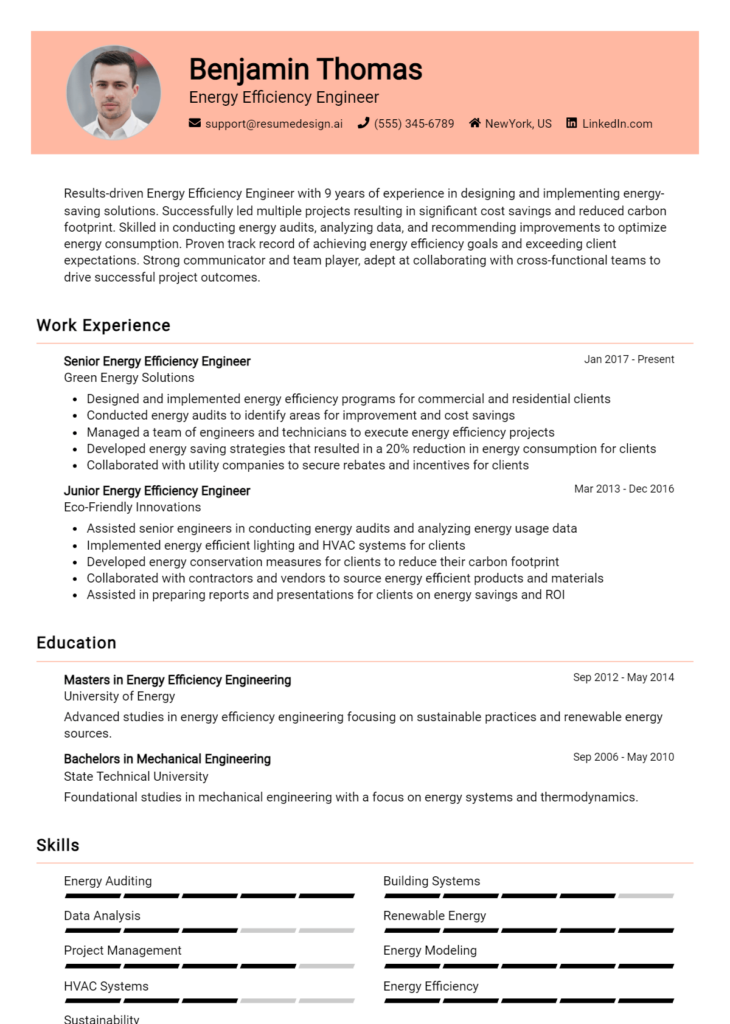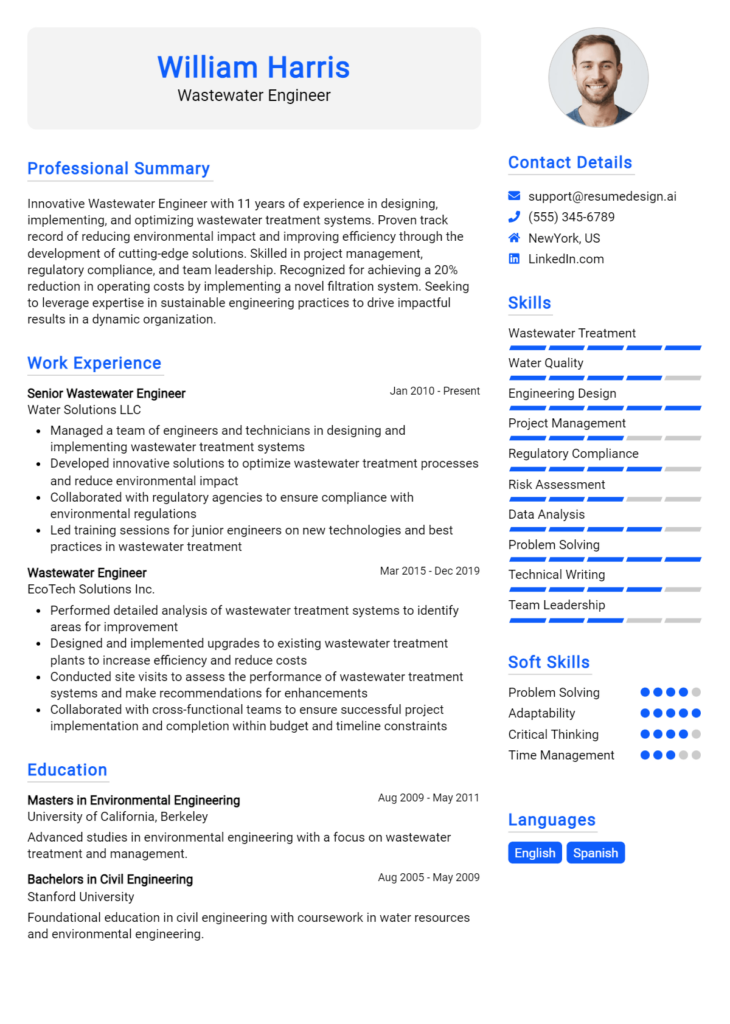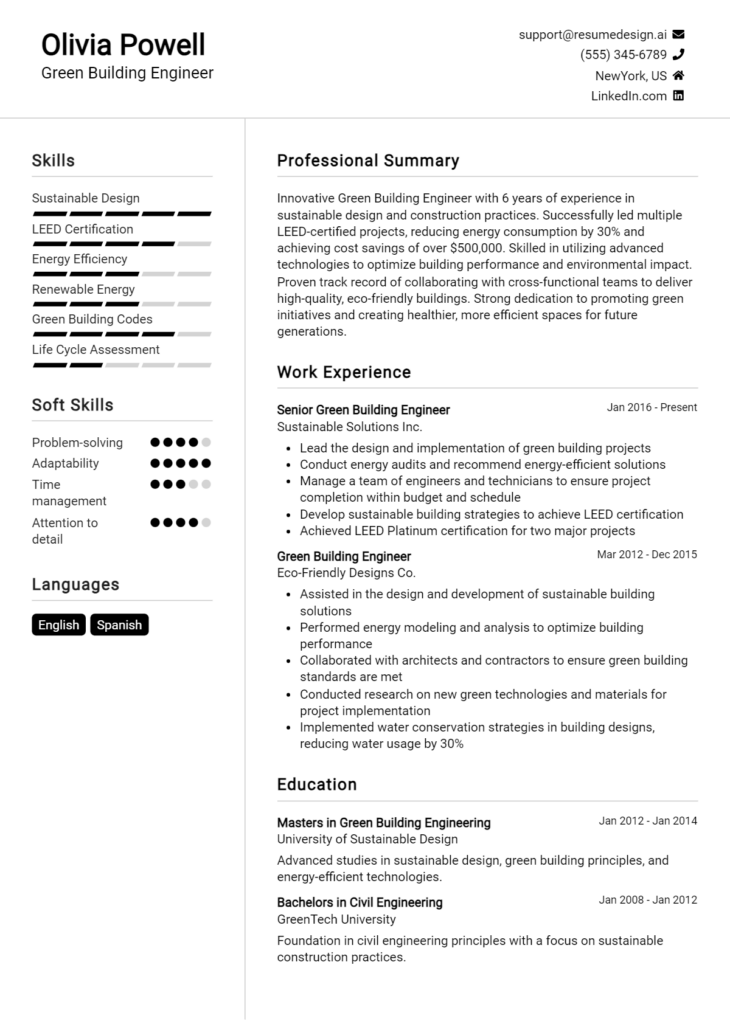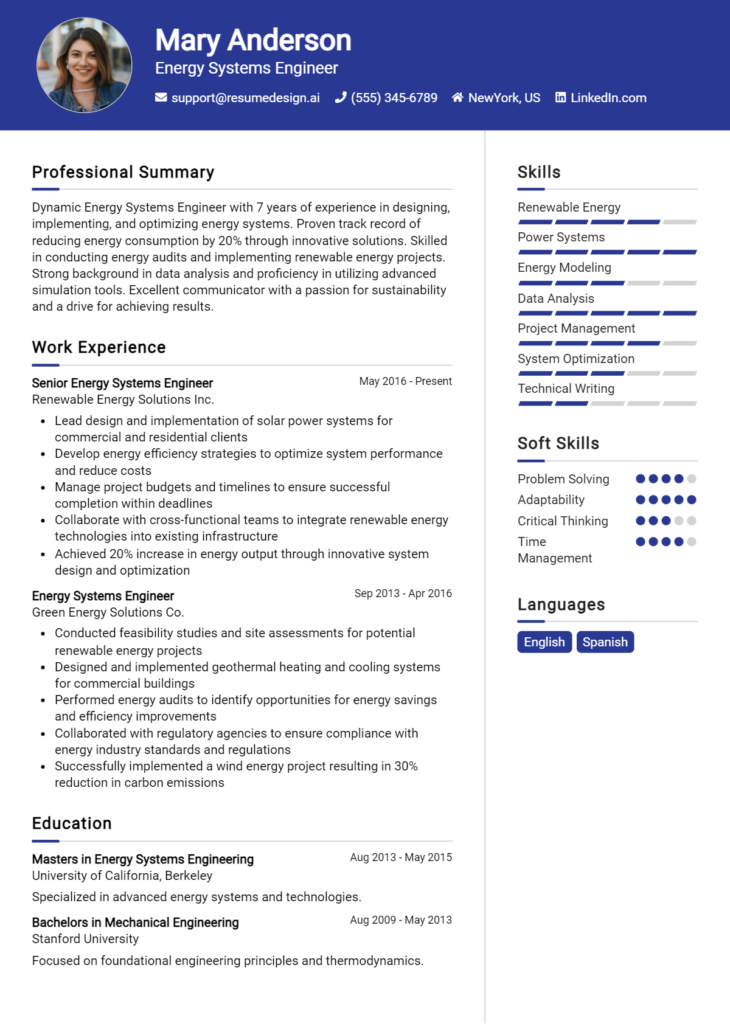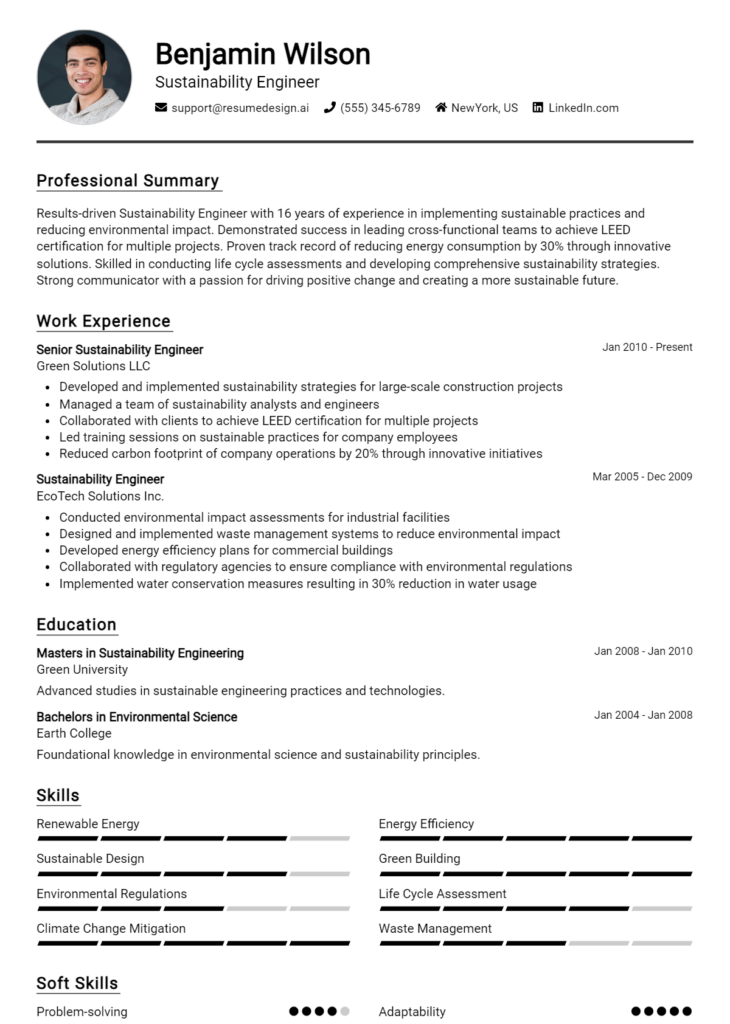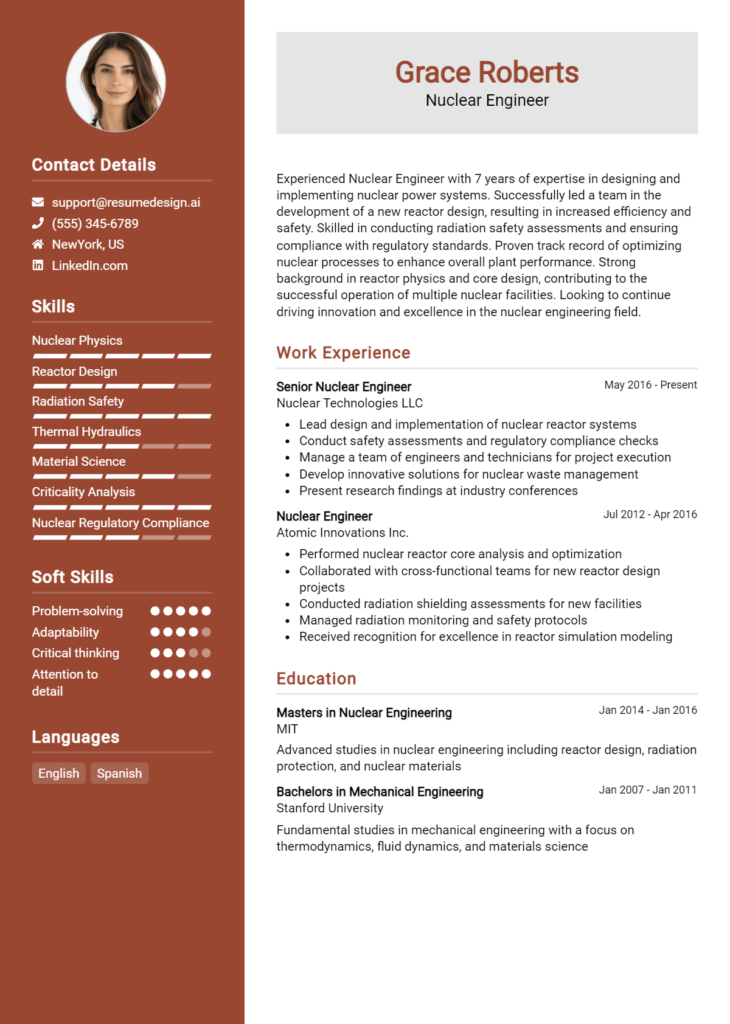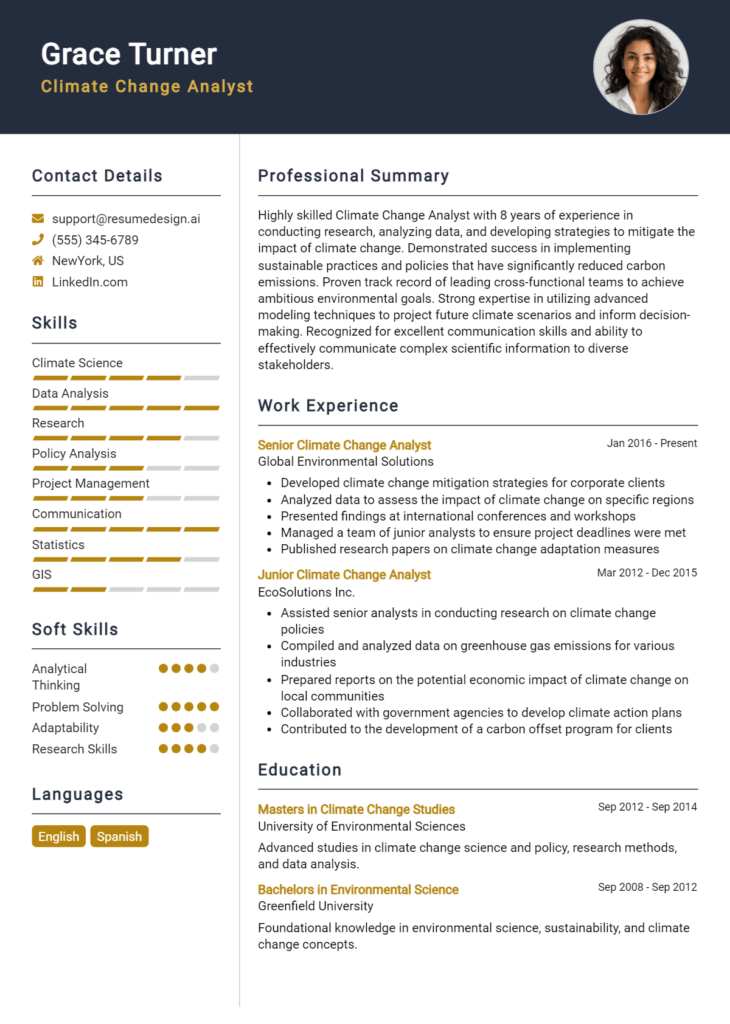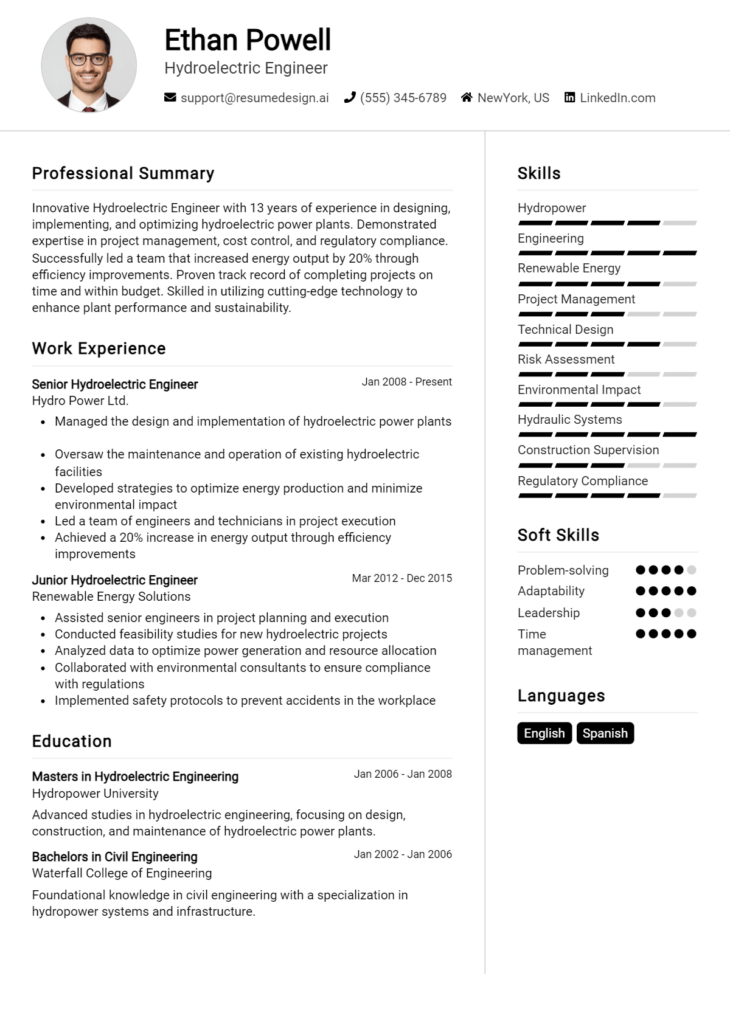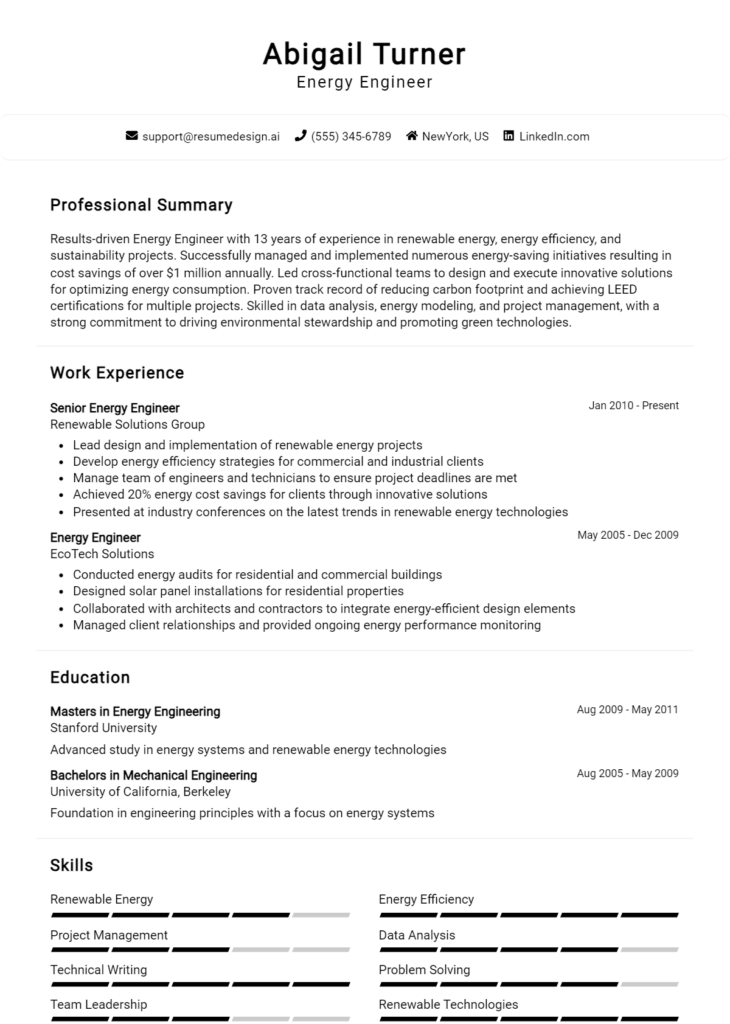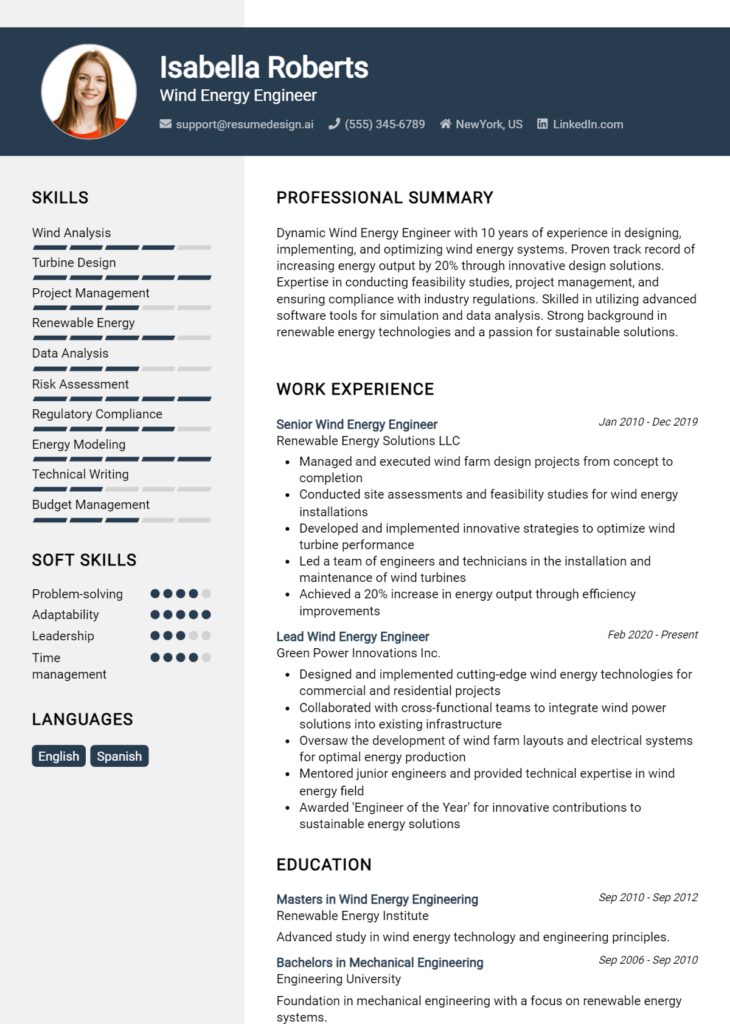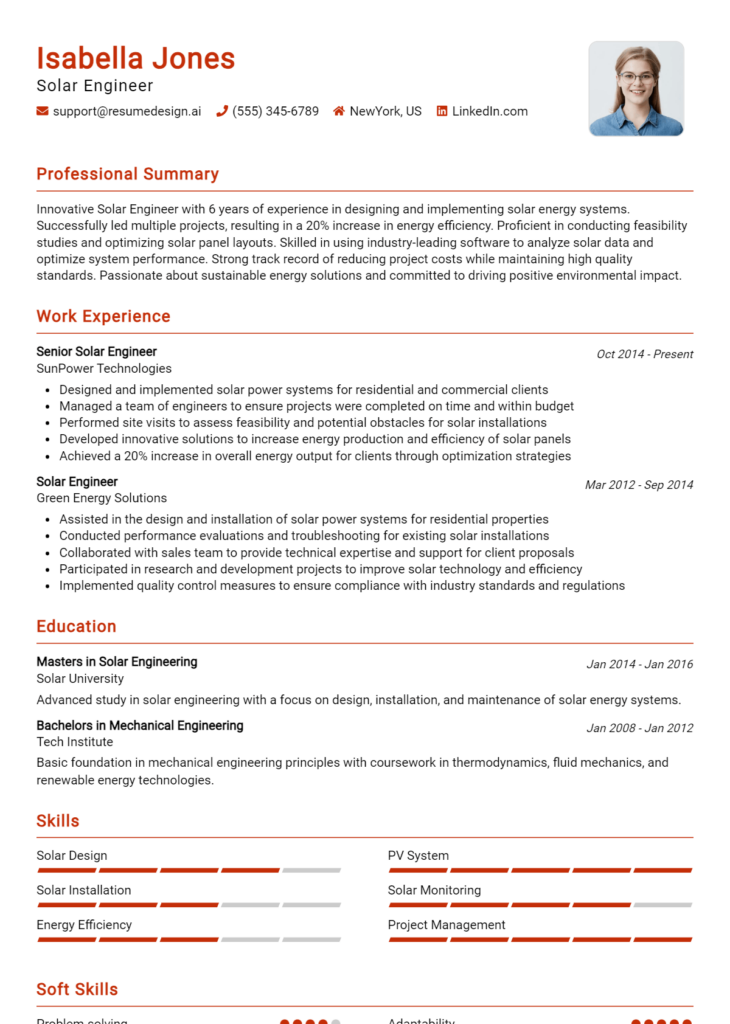Water Treatment Engineer Core Responsibilities
A Water Treatment Engineer plays a crucial role in ensuring the safe and efficient treatment of water. Key responsibilities include designing treatment systems, conducting water quality assessments, and optimizing operational processes. This role bridges various departments, requiring technical expertise in engineering, strong operational management, and effective problem-solving skills. Successful engineers contribute significantly to organizational goals by enhancing water quality and sustainability. A well-structured resume can effectively showcase these qualifications, highlighting the engineer's ability to collaborate across functions.
Common Responsibilities Listed on Water Treatment Engineer Resume
- Design and implement water treatment processes and systems.
- Conduct regular water quality testing and analysis.
- Collaborate with environmental scientists and regulatory agencies.
- Develop and enforce water treatment protocols and safety standards.
- Monitor and optimize operational performance of treatment plants.
- Prepare technical reports and documentation for compliance.
- Identify and troubleshoot operational issues in treatment facilities.
- Provide training and support to plant personnel.
- Research and integrate new technologies for improved efficiency.
- Manage project budgets and timelines effectively.
- Ensure adherence to environmental regulations and best practices.
- Participate in community outreach and education initiatives.
High-Level Resume Tips for Water Treatment Engineer Professionals
A well-crafted resume is crucial for Water Treatment Engineer professionals, as it serves as the first impression a candidate makes on potential employers. In a competitive job market, your resume must not only highlight your technical skills and industry knowledge but also showcase your achievements and contributions to previous projects. A strong resume can effectively communicate your unique qualifications, making you stand out among other applicants. This guide will provide practical and actionable resume tips specifically tailored for Water Treatment Engineer professionals, helping you present your best self to prospective employers.
Top Resume Tips for Water Treatment Engineer Professionals
- Tailor your resume for each job application by including keywords from the job description to align your skills with the employer's needs.
- Highlight relevant experience in water treatment processes, such as filtration, chemical treatment, and wastewater management, to demonstrate your expertise.
- Quantify your achievements with specific metrics, such as the percentage of efficiency improvements or cost reductions you achieved in previous projects.
- Showcase industry-specific skills, including knowledge of environmental regulations, water quality testing, and system optimization techniques.
- Include any certifications or licenses relevant to the water treatment field, such as a Professional Engineer (PE) license or water treatment operator certification.
- Emphasize your problem-solving abilities by detailing specific challenges you addressed in past roles and the innovative solutions you implemented.
- Utilize a clean and professional format that enhances readability, ensuring hiring managers can easily navigate your qualifications.
- Incorporate a summary statement at the top of your resume that encapsulates your experience and career goals in water treatment engineering.
- Highlight teamwork and collaboration experiences, as water treatment projects often involve working closely with multidisciplinary teams.
By implementing these tips, you can significantly enhance your resume and increase your chances of landing a job in the Water Treatment Engineer field. A well-structured and targeted resume will not only showcase your qualifications but also demonstrate your commitment to excellence in this vital industry, making you a standout candidate in the eyes of potential employers.
Why Resume Headlines & Titles are Important for Water Treatment Engineer
In the competitive field of water treatment engineering, a well-crafted resume headline or title is crucial for making a strong first impression. A powerful headline can immediately capture the attention of hiring managers, succinctly summarizing a candidate's key qualifications in just a few words. It serves as a snapshot of the candidate's professional identity, conveying their expertise and relevance to the role being applied for. By crafting a concise, relevant, and impactful headline, candidates can enhance their visibility and increase the likelihood of their resume being noticed among numerous applicants.
Best Practices for Crafting Resume Headlines for Water Treatment Engineer
- Keep it concise: Aim for 8-12 words that convey your core expertise.
- Be role-specific: Use terminology and keywords specific to water treatment engineering.
- Highlight key qualifications: Focus on your main skills or experiences relevant to the position.
- Use action-oriented language: Start with strong verbs or phrases that reflect your capabilities.
- Avoid jargon: Ensure clarity by avoiding overly technical or industry-specific terms that could confuse the reader.
- Tailor for each application: Customize your headline for each job to align with the employer’s needs.
- Include measurable achievements: If possible, incorporate numbers or outcomes to demonstrate impact.
- Stay professional: Maintain a formal tone appropriate for the engineering field.
Example Resume Headlines for Water Treatment Engineer
Strong Resume Headlines
Innovative Water Treatment Engineer with 10+ Years of Experience in Sustainable Solutions
Certified Water Quality Specialist Focused on Advanced Filtration and Treatment Technologies
Results-Driven Water Treatment Professional Specializing in Regulatory Compliance and Process Optimization
Weak Resume Headlines
Water Treatment Engineer Seeking Opportunities
Experienced Engineer Looking for a Job in Water Treatment
The strong headlines are effective because they immediately convey the candidate’s relevant experience, specialized skills, and unique contributions to the field of water treatment engineering. They reflect specific qualifications that align with the requirements of the role, making it easy for hiring managers to see the candidate's potential value. In contrast, the weak headlines fail to impress because they are vague and non-specific, lacking the detail needed to capture attention and showcase the candidate's strengths. They do not differentiate the applicant from others, which can lead to their resume being overlooked in a competitive job market.
Writing an Exceptional Water Treatment Engineer Resume Summary
A well-crafted resume summary is crucial for Water Treatment Engineers as it serves as the first impression for hiring managers. This brief yet powerful introduction highlights the candidate’s key skills, relevant experience, and notable accomplishments in the field of water treatment. A strong summary quickly captures attention and establishes the candidate's qualifications, making it easier for hiring managers to identify the right fit for the role. To maximize impact, the summary should be concise, compelling, and specifically tailored to align with the job description, ensuring it resonates with the employer's needs.
Best Practices for Writing a Water Treatment Engineer Resume Summary
- Quantify Achievements: Use numbers to showcase your accomplishments, such as the percentage of water quality improvement or cost savings achieved.
- Focus on Relevant Skills: Highlight technical skills that are pertinent to water treatment engineering, such as chemical analysis, filtration systems, and regulatory compliance.
- Tailor the Summary: Customize the summary for each job application, aligning your skills and experiences with the specific requirements of the position.
- Be Concise: Keep the summary brief, ideally 3-5 sentences, while ensuring it encapsulates your core strengths.
- Use Action Verbs: Start sentences with strong action verbs to create a dynamic and engaging narrative.
- Emphasize Certifications and Education: Mention any relevant certifications or degrees that enhance your credibility in the field.
- Showcase Problem-Solving Abilities: Highlight experiences where you effectively solved complex issues related to water treatment.
- Incorporate Industry Keywords: Use terminology and keywords from the job description to improve your visibility to applicant tracking systems (ATS).
Example Water Treatment Engineer Resume Summaries
Strong Resume Summaries
Dedicated Water Treatment Engineer with over 7 years of experience in designing and optimizing treatment processes, resulting in a 30% reduction in operational costs and a 25% improvement in water quality standards compliance.
Results-driven engineer with a proven track record of implementing innovative filtration technologies, achieving a 50% increase in water recovery rates while ensuring adherence to environmental regulations.
Skilled in chemical analysis and water quality assessment, with a Master's degree in Environmental Engineering and certifications in water treatment operations, successfully managing projects that improved system efficiency by 40%.
Weak Resume Summaries
Experienced engineer looking for a new opportunity in water treatment.
Water Treatment Engineer with some experience and knowledge of various systems.
The strong resume summaries are considered effective because they provide specific metrics, relevant skills, and concrete examples of achievements that demonstrate the candidate’s value. In contrast, the weak summaries lack detail and quantifiable outcomes, making them less engaging and informative for hiring managers. Vague language and generic statements fail to convey the candidate's qualifications, reducing their chances of standing out in a competitive job market.
Work Experience Section for Water Treatment Engineer Resume
The work experience section of a Water Treatment Engineer resume is a critical component that provides potential employers with a clear overview of the candidate's technical skills and professional journey. This section not only highlights the individual's ability to manage teams and projects effectively but also demonstrates their capacity to deliver high-quality water treatment solutions. By quantifying achievements and aligning experiences with industry standards, candidates can significantly enhance their prospects of securing desirable positions in this competitive field.
Best Practices for Water Treatment Engineer Work Experience
- Focus on technical expertise by detailing specific technologies, methodologies, and processes used in previous roles.
- Quantify results and achievements with measurable data, such as percentages, costs saved, or improvements made to system efficiencies.
- Highlight leadership and team management experiences, showcasing any projects where you led a team or contributed to significant outcomes.
- Include relevant certifications, training, and continued education that underscore your commitment to industry standards.
- Tailor your experiences to the job description, ensuring keywords and skills match the requirements of the position you’re applying for.
- Demonstrate collaboration by discussing cross-functional projects or partnerships with regulatory agencies and other stakeholders.
- Use action verbs to convey a sense of responsibility and initiative in your roles.
- Keep descriptions concise and focused, avoiding unnecessary jargon that could obscure your contributions.
Example Work Experiences for Water Treatment Engineer
Strong Experiences
- Led a team of 5 engineers in the design and implementation of a new filtration system that improved water quality by 30% while reducing operational costs by 20% over two years.
- Managed a $500,000 project to upgrade wastewater treatment facilities, successfully completing the project 3 months ahead of schedule and under budget.
- Collaborated with environmental agencies to ensure compliance with regulations, resulting in a 100% pass rate during annual inspections over a 4-year period.
- Designed and executed a training program for new staff, improving team efficiency by 25% and enhancing knowledge retention as evidenced by post-training assessments.
Weak Experiences
- Worked on water treatment projects that involved various tasks.
- Assisted in the maintenance of treatment equipment.
- Participated in team meetings regarding water quality improvements.
- Engaged with clients about their needs in water treatment.
The examples provided demonstrate a clear distinction between strong and weak experiences. Strong experiences are characterized by their specificity, quantifiable achievements, and a clear demonstration of leadership and collaboration, making them impactful and relevant to potential employers. In contrast, weak experiences tend to be vague and lack measurable outcomes, failing to convey the candidate's true capabilities and contributions within the water treatment field.
Education and Certifications Section for Water Treatment Engineer Resume
The education and certifications section of a Water Treatment Engineer resume is crucial as it serves to showcase the candidate's academic credentials, industry-relevant certifications, and commitment to continuous professional development. This section not only reflects the foundational knowledge and technical skills gained through formal education but also highlights any specialized training or certifications that align with the job role. By detailing relevant coursework and certifications, candidates can significantly enhance their credibility and demonstrate their alignment with the specific requirements of the water treatment engineering field.
Best Practices for Water Treatment Engineer Education and Certifications
- Prioritize relevant degrees, such as a Bachelor's or Master's in Environmental Engineering, Civil Engineering, or Chemical Engineering.
- Include specific, industry-recognized certifications such as Certified Water Treatment Plant Operator or Professional Engineer (PE) license.
- Highlight coursework that directly relates to water treatment processes, environmental regulations, and sustainable practices.
- List any specialized training programs or workshops attended related to emerging water treatment technologies.
- Keep the information up-to-date by regularly reviewing and adding new qualifications or certifications.
- Use clear and concise formatting to make it easy for hiring managers to identify key qualifications quickly.
- Consider adding honors or awards received during your educational journey to demonstrate excellence in the field.
- Tailor this section for each job application to emphasize the most relevant qualifications for the specific role.
Example Education and Certifications for Water Treatment Engineer
Strong Examples
- Bachelor of Science in Civil Engineering, University of XYZ, 2018
- Certified Water Treatment Plant Operator (CWTPO), National Association of Water Companies, 2020
- Advanced Wastewater Treatment Processes, Certification Program, ABC Technical Institute, 2021
- Master of Science in Environmental Engineering, University of ABC, 2022
Weak Examples
- Bachelor of Arts in History, University of XYZ, 2015
- Certification in Basic First Aid, Red Cross, 2019
- Online Course in Gardening Techniques, 2020
- High School Diploma, Anytown High School, 2014
The strong examples are considered effective because they directly relate to the field of water treatment engineering, showcasing relevant degrees and recognized certifications that enhance the candidate's qualifications. In contrast, the weak examples lack relevance to the water treatment sector, featuring unrelated degrees and certifications that do not support the candidate's suitability for the role, thereby diminishing their overall appeal to potential employers.
Top Skills & Keywords for Water Treatment Engineer Resume
As a Water Treatment Engineer, possessing the right skills is crucial for ensuring the efficient treatment and management of water resources. A well-crafted resume that highlights both hard and soft skills can significantly enhance your employability in this critical field. Employers seek individuals who not only have technical expertise but also possess the interpersonal qualities needed to collaborate effectively with teams and stakeholders. By focusing on relevant skills, candidates can demonstrate their qualifications and readiness to tackle the challenges associated with water treatment processes. For a comprehensive understanding of the essential skills needed in this profession, it's beneficial to explore both soft skills and hard skills.
Top Hard & Soft Skills for Water Treatment Engineer
Soft Skills
- Problem-solving
- Communication skills
- Team collaboration
- Critical thinking
- Adaptability
- Attention to detail
- Time management
- Project management
- Analytical thinking
- Leadership capabilities
Hard Skills
- Knowledge of water treatment processes
- Proficiency in water quality testing
- Familiarity with environmental regulations
- Expertise in chemical dosing and control
- Use of water treatment software
- Understanding of hydraulic systems
- Data analysis and interpretation
- Design and implementation of treatment systems
- Experience with laboratory equipment
- Technical report writing
Stand Out with a Winning Water Treatment Engineer Cover Letter
Dear [Hiring Manager's Name],
I am writing to express my interest in the Water Treatment Engineer position at [Company Name], as advertised on [Job Board/Company Website]. With a Bachelor’s degree in Environmental Engineering and over five years of hands-on experience in water treatment processes, I am excited about the opportunity to contribute my expertise in ensuring clean, safe, and sustainable water resources. My strong analytical skills, coupled with a proven track record in developing efficient treatment systems, make me a strong candidate for this role.
In my previous position at [Previous Company Name], I successfully led a team in the design and implementation of an innovative water treatment facility that increased efficiency by 30% while reducing operational costs. I am well-versed in regulatory compliance, having ensured our projects adhered to both state and federal water quality standards. My commitment to sustainability drives my approach to engineering solutions; I have a passion for creating environmentally friendly processes that not only meet client needs but also contribute positively to the community.
I am particularly drawn to [Company Name] because of your commitment to advancing water treatment technology and sustainable practices. I am eager to bring my background in process optimization and project management to your team, collaborating with fellow engineers to enhance water treatment operations and improve service delivery. I am excited about the possibility of working with innovative technologies and contributing to projects that align with my values and professional goals.
Thank you for considering my application. I look forward to the opportunity to discuss how my experience and vision align with the needs of your team. I am enthusiastic about the potential to make a meaningful impact at [Company Name] and am available at your convenience for an interview.
Sincerely,
[Your Name]
[Your Phone Number]
[Your Email Address]
Common Mistakes to Avoid in a Water Treatment Engineer Resume
When crafting a resume as a Water Treatment Engineer, it's crucial to present your skills and experiences effectively to stand out in a competitive job market. However, many candidates fall into common pitfalls that can detract from their qualifications and make their applications less appealing. Avoiding these missteps can significantly enhance your chances of securing an interview and showcasing your expertise in water treatment processes and technologies.
Lack of Specificity: Using vague language or general terms can fail to highlight your unique skills. Be specific about your expertise in different water treatment methods and technologies.
Ignoring Keywords: Many companies use Applicant Tracking Systems (ATS) to filter resumes. Failing to include relevant keywords from the job description can result in your resume being overlooked.
Overloading with Jargon: While it's important to demonstrate technical knowledge, using too much industry jargon can alienate hiring managers who may not be familiar with all terms. Strive for clarity and balance.
Neglecting Soft Skills: Focusing solely on technical skills can be a mistake. Water Treatment Engineers also need strong communication, problem-solving, and teamwork abilities, which should be evident in your resume.
Poor Formatting: A cluttered or unprofessional layout can make your resume difficult to read. Use clear headings, bullet points, and consistent fonts to enhance readability.
Omitting Relevant Certifications: Certifications can significantly boost your credibility. Ensure that you include all relevant licenses and certifications related to water treatment and environmental engineering.
Listing Responsibilities Instead of Achievements: Simply listing job duties doesn't set you apart. Highlight your accomplishments and the impact you made in previous roles to demonstrate your effectiveness.
Ignoring the Cover Letter: Some candidates overlook the importance of a cover letter. A well-crafted cover letter can complement your resume by providing additional context about your skills and passion for the role.
Conclusion
As a Water Treatment Engineer, your role is crucial in ensuring the safety and efficiency of water systems. Throughout this article, we have highlighted the essential skills and qualifications necessary for success in this field, including expertise in water quality analysis, familiarity with treatment technologies, and a strong understanding of environmental regulations.
We also discussed the importance of hands-on experience and continuous learning in keeping up with advancements in water treatment processes. Additionally, networking with other professionals and participating in relevant certifications can significantly enhance your career prospects.
In conclusion, it's time to take a closer look at your Water Treatment Engineer resume to ensure it accurately reflects your skills and experiences. Consider utilizing resources like resume templates, a resume builder, resume examples, and cover letter templates to craft a standout application. Take action today and make sure your resume shines as brightly as the water systems you help to maintain!

